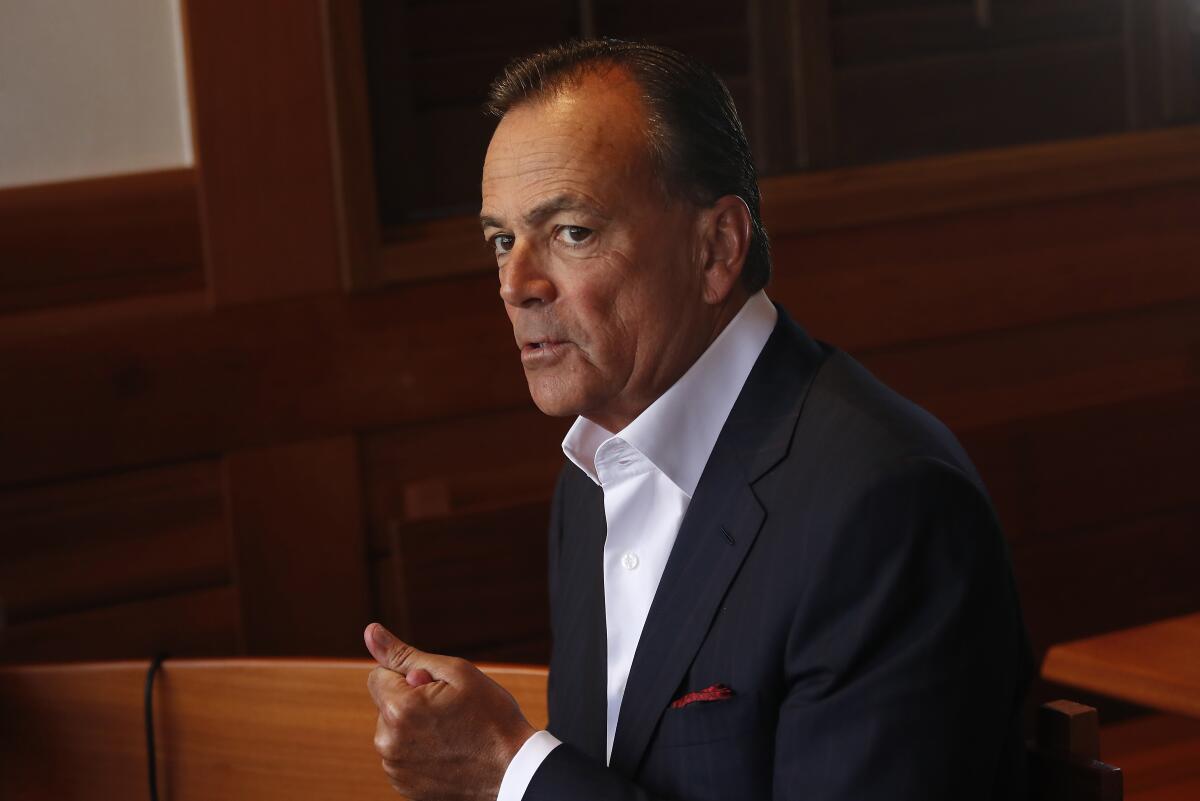Now you can pay rent in bitcoin, at least at mall magnate Rick Caruso’s apartments

- Share via
Developer Rick Caruso is known for his lavish outdoor malls, luxe seaside resort near Santa Barbara and stewardship of USC as chair of the board of trustees. Next up: He’s planning to make a splash in cryptocurrency.
In what may be a real estate industry first, bitcoin will now be accepted for residential and commercial rent at the Grove shopping center and other properties owned by Caruso. The Los Angeles real estate magnate is planning other digital efforts such as using blockchain technology to support a new rewards program for shoppers.
One of his first tenants to pay in bitcoin may be Elon Musk, chief executive of Tesla Inc., who operates a store selling Tesla electric cars at the Americana at Brand center in Glendale.
Caruso announced Wednesday that his company had invested in bitcoin as part of a partnership with Gemini, a cryptocurrency exchange founded by Tyler and Cameron Winklevoss. The twins gained fame for suing former Harvard classmate Mark Zuckerberg, accusing him of stealing their idea for a social network that became Facebook.
As a result of the deal, about 1% of Caruso Properties’ treasury is in bitcoin, Caruso said, although he declined to reveal the dollar value.

“I believe it’s a good hedge” to diversify the company’s finances, Caruso said, “and has already proven to be a good investment for us.”
The operator of nine outdoor malls acknowledged that there hadn’t been a clamor from tenants to pay rent in bitcoin, but Caruso said he wanted to be prepared as cryptocurrency grew more widely accepted.
The volatile digital asset has appreciated at a furious rate and has reached a point — trading roughly between $50,000 and $60,000 apiece in the last month — where it’s seen more as an investment, albeit speculative, than something to spend on everyday expenses such as rent.
Federal Reserve Board Chairman Jerome H. Powell last month described bitcoin and its crypto cousins as “not really useful stores of value. And they’re not backed by anything.” Still, several big banking names, including Goldman Sachs and Mastercard International, have been making cryptocurrency moves.
Caruso compared bitcoin to credit cards, which started in the 1950s as odd rarities before becoming mainstream.
“I believe bitcoin and blockchain are going to be doing the same in the future,” Caruso said. “We want to be ahead of the curve.”
Blockchains are used for recording transactions made with cryptocurrencies, such as bitcoin, and have other applications Caruso may use in his planned rewards program.
Tesla is making a $1.5-billion investment in the cryptocurrency bitcoin. That’s more than Tesla has spent on R&D in any of the last three years.
Tesla announced in February that it had purchased $1.5 billion worth of bitcoin and would start accepting it as payment for its products, which include cars, solar panels and batteries.
Tesla said in a filing with the Securities and Exchange Commission that bitcoin would provide “more flexibility to further diversify and maximize returns on our cash.”
Musk has been a strong proponent of bitcoin on Twitter and elsewhere. But would he use the currency, which quadrupled in value in 2020, to pay the rent on a Tesla store?
“I haven’t talked to Elon about it,” Caruso said. “He may be the first, as a pioneer, to pay his rent in bitcoin.”
Shoppers have returned to Caruso’s malls as officials have eased coronavirus restrictions, and some retailers are seeing sales revenue at pre-pandemic levels or above, he said.
“There has been so much forced savings in the economy,” he said, “people are out spending money and doing it gladly because they have been cooped up for so long.”
In addition to accepting bitcoin from retailers for rent, Caruso will now take bitcoin rent payments for his apartments. He has a combined 350 units for lease at the Americana, at Palisades Village in Pacific Palisades, and at 8500 Burton Way, a luxury complex near the Grove.
Gemini, which is based in New York, will administer Caruso’s cryptocurrency operations.
“We are thrilled to partner with Caruso as they continue to push the real estate sector to new heights by embracing cryptocurrency for the benefit of both their customer experience and their own business operations,” Gemini Chief Executive Tyler Winklevoss said in a statement. “We are excited to help them execute their digital asset treasury strategy and advise them more broadly throughout their cryptocurrency journey.”
Caruso’s new loyalty rewards program is still being developed but may become a widely used element of his cryptocurrency program and is intended to hold particular appeal for younger customers, he said.

Shoppers may accumulate points on a blockchain-based credit card that could be redeemed in fairly conventional ways, such as paying for visits to Caruso’s Rosewood Miramar Beach resort in Montecito, where rooms go for more than $1,000 a night, or for more unusual rewards such as non-fungible tokens.
The technology behind Thursday’s $69-million digital painting sale may be a bubble, or it may be the wave of the future in art and media. Maybe both.
NFTs, as they are known, are a type of blockchain unit that represents a unique digital asset, such as a piece of art. An NFT version of Twitter cofounder Jack Dorsey’s first tweet sold for $2.9 million in March.
A blockchain-based system gives customers flexibility to redeem rewards in ways they find most appealing, Caruso said.
“There are billions of dollars’ worth of unredeemed rewards programs around the country because they are not engaging,” he said. “People are quite engaged when it comes to cryptocurrency.”
More to Read
Inside the business of entertainment
The Wide Shot brings you news, analysis and insights on everything from streaming wars to production — and what it all means for the future.
You may occasionally receive promotional content from the Los Angeles Times.












